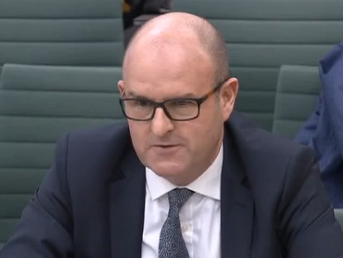
Daily Express editor Gary Jones has said he is “comfortable” with standards set out in new guidelines on the reporting of Muslims and Islam and that they are not “about censorship or control”.
Press regulator the Independent Press Standards Organisation put the guidance together with help from publishers and community groups, saying it was important to avoid “conjecture that maligns whole communities”.
The guidelines, which have been in the making for almost two years, urge journalists to avoid making “pejorative or prejudicial remarks about an individual on the basis of their religion (or other personal characteristics)”.
Beyond this, however, IPSO insisted it does not seek to “specify or limit the language that journalists can use to report on Islam or Muslims in the UK.
“This would curtail freedom of expression and the ability of the press to challenge, scrutinise, and debate.”
If the subject of a story is Muslim, this should only be referenced if it is genuinely relevant to the story under the discrimination clause in the Editors’ Code of Practice, the guidelines state.
“Clause 12 should not be interpreted as preventing criticism merely because, as is inescapable, many individuals subscribe to that faith,” the guidelines say.
“Were it otherwise, the freedom of the press to engage in discussion, criticism and debate about religious ideas and practices would be restricted.”
The guidelines also remind editors of the importance of accuracy and list some common misconceptions about Muslims, noting that they are “not a monolithic community”.
“There exist a number of generalisations and stereotypes in British society, including around Islam and Muslims,” they state.
“While the Code does not prohibit the use of generalisations within coverage, it does require that journalists draw a distinction between comment, conjecture and fact in their reporting. Journalists should take care that stereotypes do not feature in factual coverage so as to uphold this distinction.”
Newspapers are entitled to publish critical opinion pieces but should not publish “inaccurate, misleading and distorted information or discriminate against an individual”.
The guidelines also include a warning about “eye-catching” headlines and note that although editors are free to “editorialise and campaign”, they should avoid omitting information that could make their reporting “inaccurate or distorted”.
‘With freedom comes responsibilities’

Daily Express editor Gary Jones Picture: ParliamentLiveTV/Screenshot
Giving his support to the guidelines, Express editor-in-chief Gary Jones said: “With fake news in abundance, accuracy is undoubtedly the key to preserving the integrity, reputation and future of the mainstream press.
“This voluntary advice which has been extensively debated isn’t about censorship or control but providing information useful in terms of accuracy and the avoidance of prejudicial language.
“A free press has the right to challenge, offend and shock. That’s an inalienable right in a democracy. Though with that freedom comes responsibilities. In my lifetime reporting on race, colour, religion, sexual orientation and disability has changed dramatically, positively and for the betterment of society. This guidance lays out the standards. I, for one, am comfortable for those standards to be set.”
Jones, who was appointed editor of the Express in early 2018, said soon after his arrival that the paper had helped to create an “Islamophobic sentiment” and some of its front pages had been “downright offensive”.
He told Press Gazette he did not want the Express to be “offensive to anybody – not immigrants or any kind of religion. I want to be as inclusive as possible”.
Upheld IPSO complaints
Between January 2017 and December 2019, 12 complaints relating to coverage of Muslims or Islam were upheld by IPSO as a breach of the Editors’ Code (scroll down for full list).
This is out of 398 complaints investigated in 2017, 507 in 2018 and 621 in 2019.
The Express website, Mail Online, Daily Mail and Times committed two breaches each in that period, while the Sunday Times, Daily Star online, Spectator and Sun had one each.
The majority of these IPSO investigations were prompted by complaints from Miqdaad Versi, assistant general secretary of the Muslim Council of Britain, who closely monitors media coverage. At the start of 2017, he said he had found that national media corrected at least 20 “significant inaccuracies” about Muslims in news stories over the previous year.
Tory peer Baroness Sayeeda Warsi told a Home Affairs Committee on the topic of hate speech in 2018 that there were “cases and cases” in the press of anti-Muslim sentiment and Islamophobia because these stories “sell papers”.
IPSO chief executive Charlotte Dewar said: “Guidance helps editors and journalists to comply with the Editors’ Code by pulling together in one place information about how the Code applies to a particular issue.
“We hope this latest piece of guidance, like other guidance we have issued in the past, will help editors and journalists to report on this important subject in a way that fulfils the high standards set by the Editors’ Code of Practice.”
The guidance received support from Fiyaz Mughal, founder of campaign groups Tell Mama to support victims of Islamophobia and Faith Matters to work on integration and hate crime, who said it was an “excellent balance”.
He said: “I strongly believe that any faith or ideology must be open to critique and that opinions by writers in publications should be protected. This means negative or derogatory opinions around faiths must be protected for publication, however much those views are disagreed with.
“However, on issues of fact that do not have anything to do with Muslims and Islam and which are woven into stories and conjecture that maligns whole communities so that it promotes discriminatory views about them, this document makes clear that there are important guidelines that should be followed.”
The stories relating to Islam or Muslims resulting in upheld IPSO complaints between 2017 and 2019:
| Publication | Year | Headline |
| Mail Online | 2017 | ‘Right on’ critics are ignoring problems caused by immigration, government tsar warns after Muslim groups condemn her ‘inflammatory call’ for newcomers to take a vow of allegiance” |
| Daily Mail | 2017 | The corner of Yorkshire that’s just 1pc white |
| Express.co.uk | 2017 | Some Muslims so isolated in UK they believe country is 75% Islamic, says shock report |
| Express.co.uk | 2017 | Anger as less than A THIRD of Muslim nations sign up to coalition against ISIS |
| Mail Online | 2018 | Landmark ruling sees British court recognise sharia law for the first time as judge rules wife married in Islamic ceremony can make claim on husband’s assets under UK law |
| Daily Star Online | 2018 | McDonald’s may be forced to close ALL restaurants in London Borough after hijab row |
| The Times | 2018 | Judge rules child must leave Muslim foster home |
| The Sunday Times | 2018 | Asians make up 80% of child groomers – study |
| The Spectator | 2018 | Accept this as the new normal? Never |
| The Sun | 2019 | Go with the BoJo or end up like dodo |
| The Times | 2019 | “Terror police boost MP’s security over criticism of Asian sex gangs”, published in print and online on 25 July 2018 |
| Daily Mail | 2019 | POWDER KEG PARIS |
IPSO-brokered corrections involving Islam before 2017 are listed here.
Email pged@pressgazette.co.uk to point out mistakes, provide story tips or send in a letter for publication on our "Letters Page" blog
